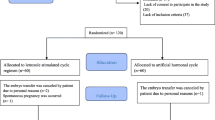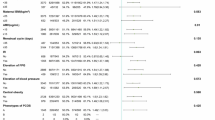Abstract
Purpose
To assess which is the optimal protocol in terms of endometrial preparation prior to frozen-thawed embryo transfer (FET) in women with polycystic ovarian syndrome (PCOS) and to explore the effect in stimulated cycle with the addition of vaginal 17-β oestradiol.
Methods
Five hundred and seventy-six patients with PCOS were prepared for FET using artificial cycle induced with oestradiol and progesterone supplementation (n = 291) and stimulated cycle induced by human menopausal gonadotrophin (HMG) within or without the addition of vaginal 17-β oestradiol (n = 285). Then the FET was performed in a receptive endometrium.
Results
Endometrial thickness was similar (9.03 ± 1.65 vs. 9.12 ± 1.58, P > 0.05) in artificial and stimulated cycle. The two protocols resulted in clinical pregnancy rate (41.0 % vs. 41.6 %, P > 0.05), ongoing pregnancy rate (36.6 % vs. 34.7 %, P > 0.05), live birth rate (30.0 % vs. 31.7 %, P > 0.05), which were not statistically different. Nevertheless, the cancelled cycle rate made a significant difference (2.2 % vs. 5.4 %, P < 0.05). There is no significant difference in the clinical pregnancy rate in HMG, HMG added with vaginal oestradiol and HMG switch to vaginal oestradiol group (42.6 %, 41.1 %, and 33.3 %, respectively).
Conclusions
The mean endometrial thickness, clinical pregnancy rate, ongoing pregnancy rate, live birth rate and implantation rate were similar in artificial and stimulated cycle for endometrial preparation prior to FET in PCOS. It was fine to add vaginal 17-β oestradiol to stimulated cycle when necessary. However, stimulated cycles had a significantly higher cancelled cycle rate. We should follow the principles of individualization, securitization and optimization in endometrial preparation of the FET in patients with PCOS.


Similar content being viewed by others
References
Trounson A, Mohr L (1983) Human pregnancy following cryopreservation, thawing and transfer of an eight-cell embryo. Nature 305:707–709
Broekmans FJ, Verweij PJ, Eijkemans MJ, Mannaerts BM, Witjes H (2014) Prognostic models for high and low ovarian responses in controlled ovarian stimulation using a GnRH antagonist protocol. Hum Reprod (Oxford, England). doi:10.1093/humrep/deu090
March WA, Moore VM, Willson KJ, Phillips DI, Norman RJ, Davies MJ (2010) The prevalence of polycystic ovary syndrome in a community sample assessed under contrasting diagnostic criteria. Hum Reprod (Oxford, England) 25:544–551
Diamanti-Kandarakis E, Dunaif A (2012) Insulin resistance and the polycystic ovary syndrome revisited: an update on mechanisms and implications. Endocr Rev 33:981–1030
Muasher SJ, Kruithoff C, Simonetti S, Oehninger S, Acosta AA, Jones GS (1991) Controlled preparation of the endometrium with exogenous steroids for the transfer of frozen-thawed pre-embryos in patients with anovulatory or irregular cycles. Hum Reprod (Oxford, England) 6:443–445
Tourgeman DE, Gentzchein E, Stanczyk FZ, Paulson RJ (1999) Serum and tissue hormone levels of vaginally and orally administered estradiol. Am J Obstet Gynecol 180:1480–1483
Van der Auwera I, Meuleman C, Koninckx PR (1994) Human menopausal gonadotrophin increases pregnancy rate in comparison with clomiphene citrate during replacement cycles of frozen/thawed pronucleate ova. Hum Reprod (Oxford, England) 9:1556–1560
Hatch R, Rosenfield RL, Kim MH, Tredway D (1981) Hirsutism: implications, etiology, and management. Am J Obstet Gynecol 140:815–830
Livadas S, Pappas C, Karachalios A, Marinakis E, Tolia N, Drakou M et al (2014) Prevalence and impact of hyperandrogenemia in 1,218 women with polycystic ovary syndrome. Endocrine. doi:10.1007/s12020-014-0200-7
Balen AH, Laven JS, Tan SL, Dewailly D (2003) Ultrasound assessment of the polycystic ovary: international consensus definitions. Hum Reprod Update 9:505–514
Steer CV, Mills CL, Tan SL, Campbell S, Edwards RG (1992) The cumulative embryo score: a predictive embryo scoring technique to select the optimal number of embryos to transfer in an in vitro fertilization and embryo transfer programme. Hum Reprod (Oxford, England) 7:117–119
Groenewoud ER, Cantineau AE, Kollen BJ, Macklon NS, Cohlen BJ (2013) What is the optimal means of preparing the endometrium in frozen-thawed embryo transfer cycles? A systematic review and meta-analysis. Hum Reprod Update 19:458–470
Paulson RJ, Hatch IE, Lobo RA, Sauer MV (1997) Cumulative conception and live birth rates after oocyte donation: implications regarding endometrial receptivity. Hum Reprod (Oxford, England) 12:835–839
Simon A, Hurwitz A, Zentner BS, Bdolah Y, Laufer N (1998) Transfer of frozen-thawed embryos in artificially prepared cycles with and without prior gonadotrophin-releasing hormone agonist suppression: a prospective randomized study. Hum Reprod (Oxford, England) 13:2712–2717
Tourgeman DE, Slater CC, Stanczyk FZ, Paulson RJ (2001) Endocrine and clinical effects of micronized estradiol administered vaginally or orally. Fertil Steril 75:200–202
Wright KP, Guibert J, Weitzen S, Davy C, Fauque P, Olivennes F (2006) Artificial versus stimulated cycles for endometrial preparation prior to frozen-thawed embryo transfer. Reprod Biomed Online 13:321–325
Paulson RJ (2011) Hormonal induction of endometrial receptivity. Fertil Steril 96:530–535
Fanchin R, Righini C, Schonauer LM, Olivennes F, Cunha Filho JS, Frydman R (2001) Vaginal versus oral E(2) administration: effects on endometrial thickness, uterine perfusion, and contractility. Fertil Steril 76:994–998
Tourgeman DE, Boostanfar R, Chang L, Lu J, Stanczyk FZ, Paulson RJ (2001) Is there evidence for preferential delivery of ovarian estradiol to the endometrium? Fertil Steril 75:1156–1158
Gonen Y, Casper RF, Jacobson W, Blankier J (1989) Endometrial thickness and growth during ovarian stimulation: a possible predictor of implantation in in vitro fertilization. Fertil Steril 52:446–450
Coulam CB, Bustillo M, Soenksen DM, Britten S (1994) Ultrasonographic predictors of implantation after assisted reproduction. Fertil Steril 62:1004–1010
Manno M, Tomei F (2014) Can we prevent premature luteinization in IVF cycles? Med Hypotheses 82:122–123
Venetis CA, Kolibianakis EM, Bosdou JK, Tarlatzis BC (2013) Progesterone elevation and probability of pregnancy after IVF: a systematic review and meta-analysis of over 60 000 cycles. Hum Reprod Update 19:433–457
Abu Hashim H (2012) Clomiphene citrate alternatives for the initial management of polycystic ovary syndrome: an evidence-based approach. Arch Gynecol Obstet 285:1737–1745
Eden JA, Place J, Carter GD, Jones J, Alaghband-Zadeh J, Pawson ME (1989) The effect of clomiphene citrate on follicular phase increase in endometrial thickness and uterine volume. Obstet Gynecol 73:187–190
Gonen Y, Casper RF (1990) Sonographic determination of a possible adverse effect of clomiphene citrate on endometrial growth. Hum Reprod (Oxford, England) 5:670–674
Mitwally MF, Casper RF (2001) Use of an aromatase inhibitor for induction of ovulation in patients with an inadequate response to clomiphene citrate. Fertil Steril 75:305–309
Hu YJ, Chen YZ, Zhu YM, Huang HF (2014) Letrozole stimulation in endometrial preparation for cryopreserved-thawed embryo transfer in women with polycystic ovarian syndrome: a pilot study. Clin Endocrinol 80:283–289
Veleva Z, Orava M, Nuojua-Huttunen S, Tapanainen JS, Martikainen H (2013) Factors affecting the outcome of frozen-thawed embryo transfer. Hum Reprod (Oxford, England) 28:2425–2431
Kim JH, Jee BC, Suh CS, Kim SH (2014) Nomogram to predict ongoing pregnancy using age of women and serum biomarkers after in vitro fertilization cycles. Eur J Obstet Gynecol Reprod Biol 172:65–69
Shapiro DB, Pappadakis JA, Ellsworth NM, Hait HI, Nagy ZP (2014) Progesterone replacement with vaginal gel versus i.m. injection: cycle and pregnancy outcomes in IVF patients receiving vitrified blastocysts. Hum Reprod (Oxford, England). doi:10.1093/humrep/deu121
Singh N, Gupta P, Mittal S, Malhotra N (2012) Correlation of body mass index with outcome of in vitro fertilization in a developing country. Arch Gynecol Obstet 285:259–263
Maheshwari A, Stofberg L, Bhattacharya S (2007) Effect of overweight and obesity on assisted reproductive technology–a systematic review. Hum Reprod Update 13:433–444
Navot D, Scott R, Droesch K, Veeck L, Liu H-C, Rosenwaks Z (1991) The window of embryo transfer and the efficiency of human conception in vitro. Fertil Steril 55:114–118
Bergh PA, Navot D (1992) The impact of embryonic development and endometrial maturity on the timing of implantation. Fertil Steril 58:537–542
Kodaman PH, Taylor HS (2004) Hormonal regulation of implantation. Obstet Gynecol Clin North Am 31:745–766
Critchley HO, Saunders PT (2009) Hormone receptor dynamics in a receptive human endometrium. Reprod Sci (Thousand Oaks, Calif) 16:191–199
Noyes N, Liu H, Sultan K, Schattman G, Rosenwaks Z (1995) Implantation: endometrial thickness appears to be a significant factor in embryo implantation in in vitro fertilization. Hum Reprod 10:919–922
El-Toukhy T, Coomarasamy A, Khairy M, Sunkara K, Seed P, Khalaf Y et al (2008) The relationship between endometrial thickness and outcome of medicated frozen embryo replacement cycles. Fertil Steril 89:832–839
Konc J, Kanyo K, Varga E, Kriston R, Cseh S (2010) The effect of cycle regimen used for endometrium preparation on the outcome of day 3 frozen embryo transfer cycle. Fertil Steril 94:767–768
Hofmann GE, Thie J, Scott RT Jr, Navot D (1996) Endometrial thickness is predictive of histologic endometrial maturation in women undergoing hormone replacement for ovum donation. Fertil Steril 66:380–383
Weissman A, Horowitz E, Ravhon A, Steinfeld Z, Mutzafi R, Golan A et al (2011) Spontaneous ovulation versus HCG triggering for timing natural-cycle frozen-thawed embryo transfer: a randomized study. Reprod Biomed Online 23:484–489
Kyrou D, Fatemi HM, Popovic-Todorovic B, Van den Abbeel E, Camus M, Devroey P (2010) Vaginal progesterone supplementation has no effect on ongoing pregnancy rate in hCG-induced natural frozen-thawed embryo transfer cycles. Eur J Obstet Gynecol Reprod Biol 150:175–179
Shi Y, Wei D, Liang X, Sun Y, Liu J, Cao Y et al (2014) Live birth after fresh embryo transfer vs elective embryo cryopreservation/frozen embryo transfer in women with polycystic ovary syndrome undergoing IVF (FreFro-PCOS): study protocol for a multicenter, prospective, randomized controlled clinical trial. Trials 15:154
Dal Prato L, Borini A (2006) Best protocol for frozen-thawed embryo transfer-cost benefit analysis needed. Fertil Steril 86:1554–1555 (author reply 5–6)
Conflict of interest
We declare that we have no conflict of interest.
Author information
Authors and Affiliations
Corresponding author
Rights and permissions
About this article
Cite this article
Yu, J., Ma, Y., Wu, Z. et al. Endometrial preparation protocol of the frozen-thawed embryo transfer in patients with polycystic ovary syndrome. Arch Gynecol Obstet 291, 201–211 (2015). https://doi.org/10.1007/s00404-014-3396-0
Received:
Accepted:
Published:
Issue Date:
DOI: https://doi.org/10.1007/s00404-014-3396-0




